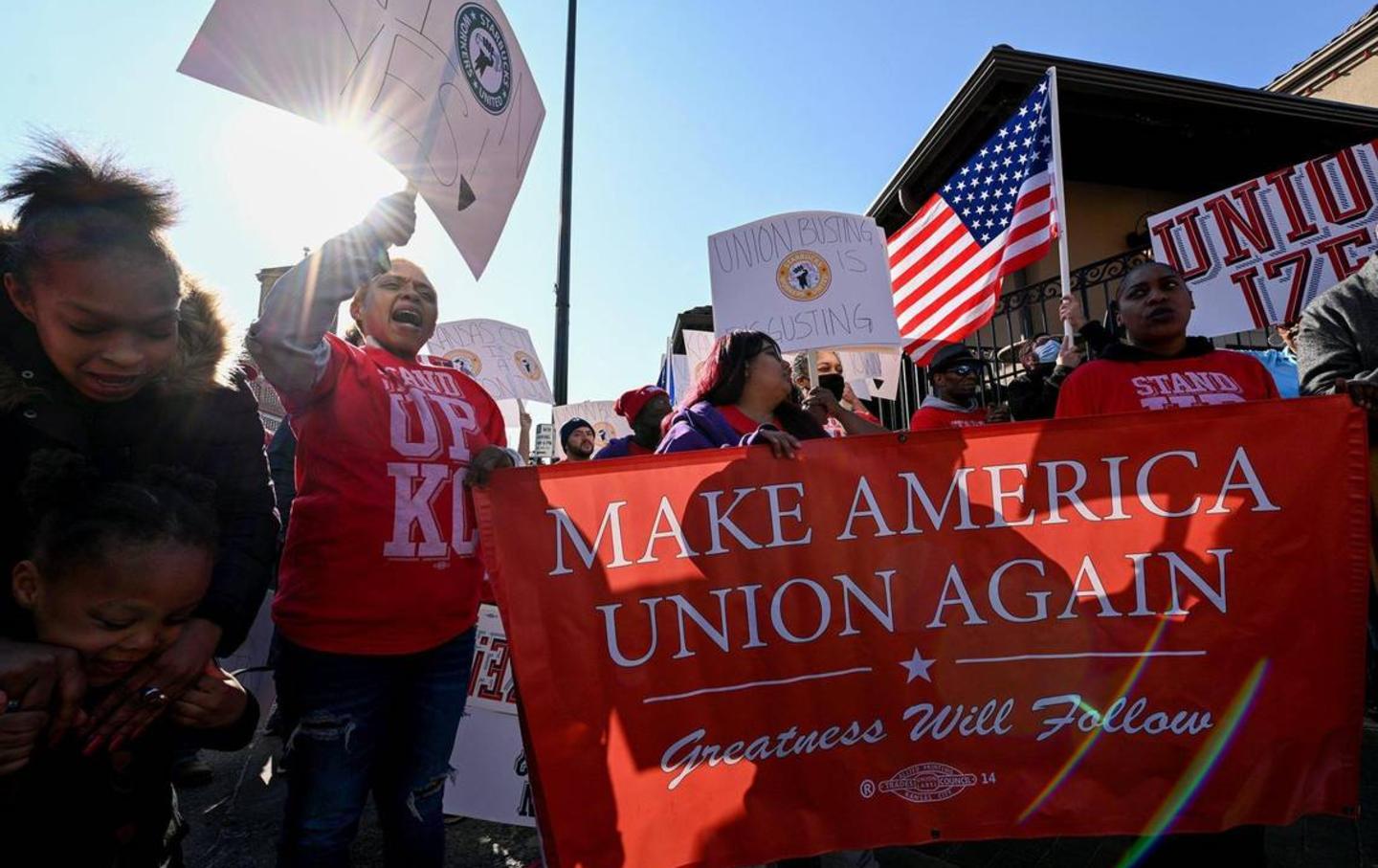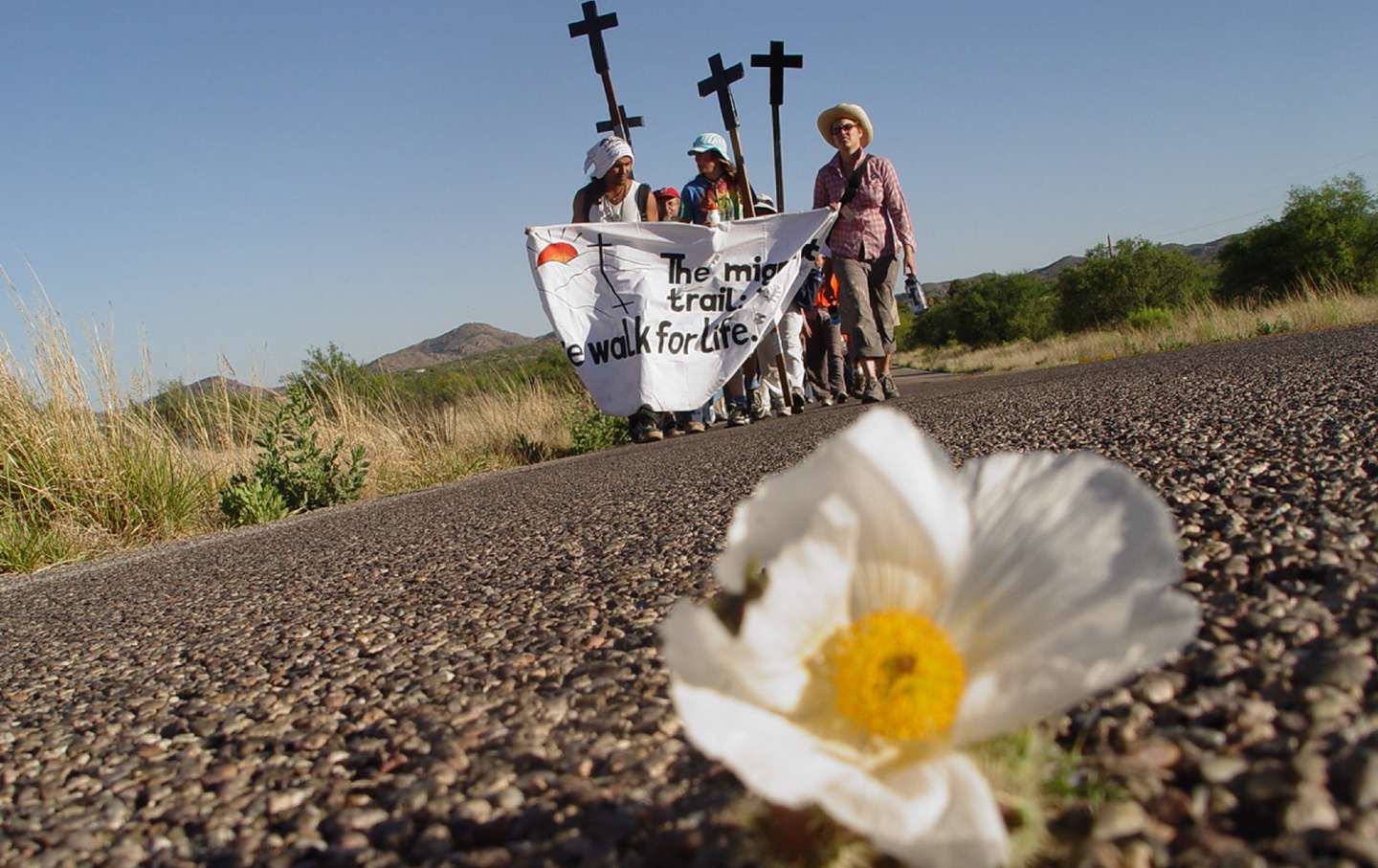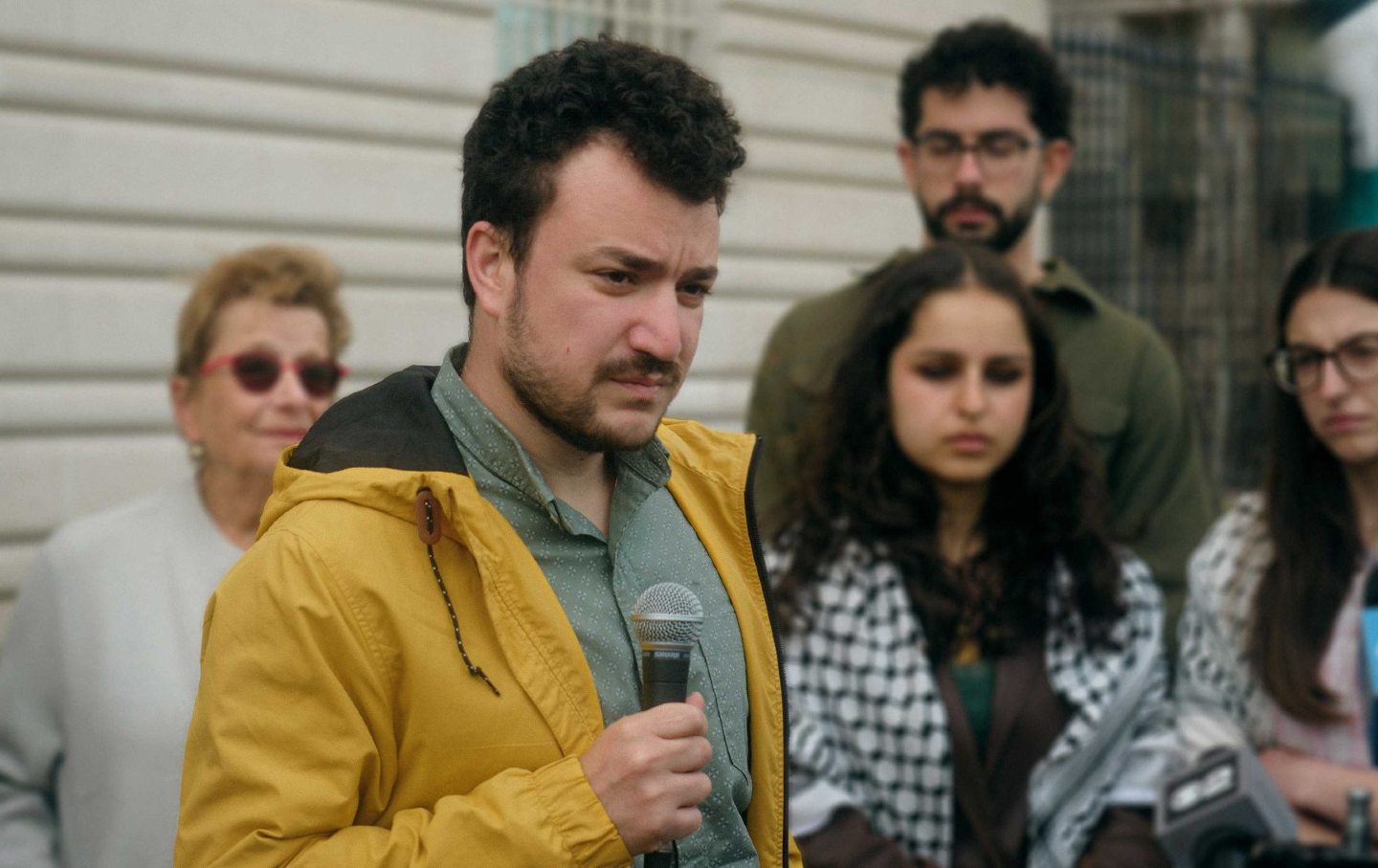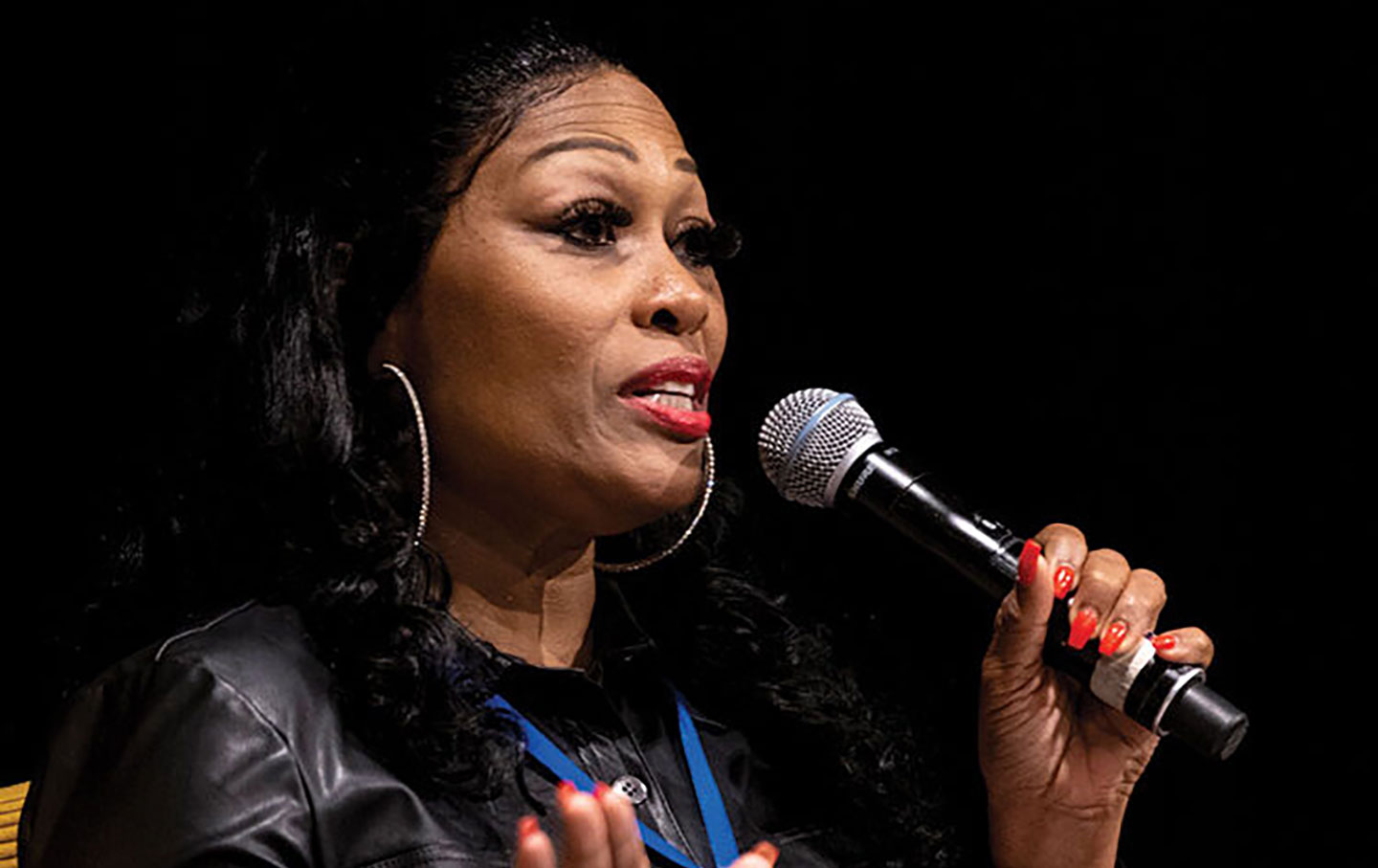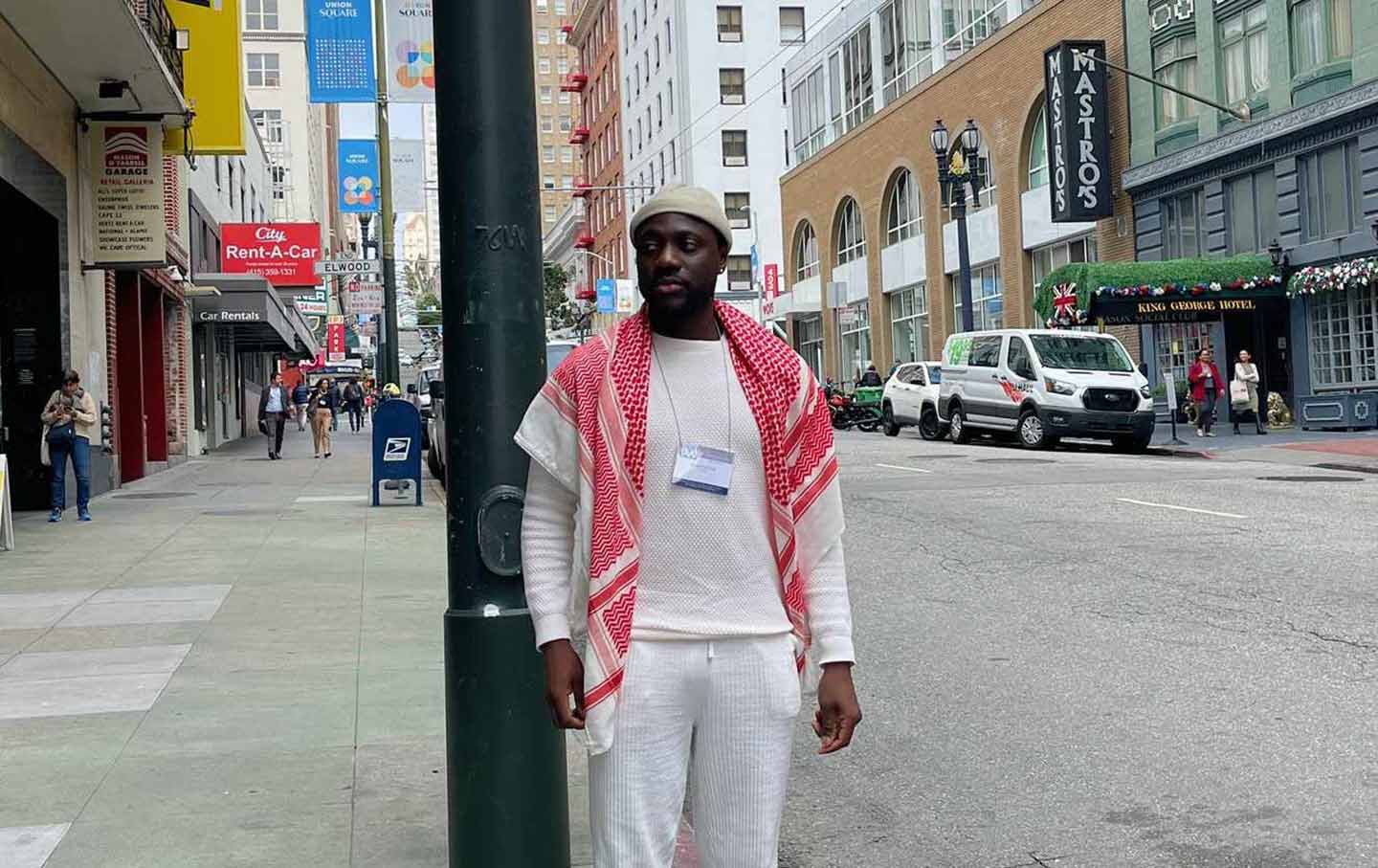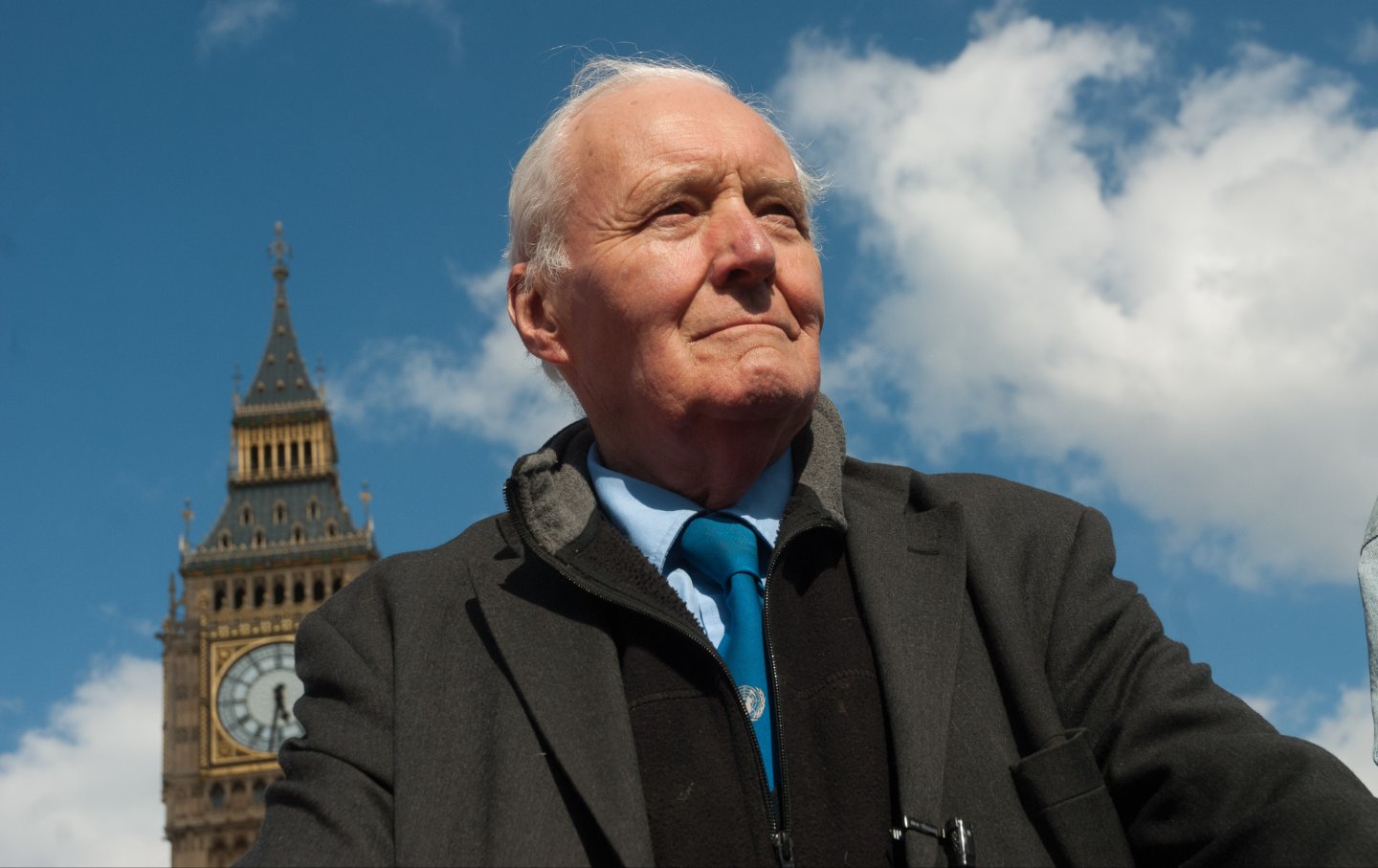How the Palestinian Justice Movement Helped Starbucks Workers United
Starbucks worker organizing produced a historic union breakthrough, and this victory came about in part because of solidarity with Palestine.
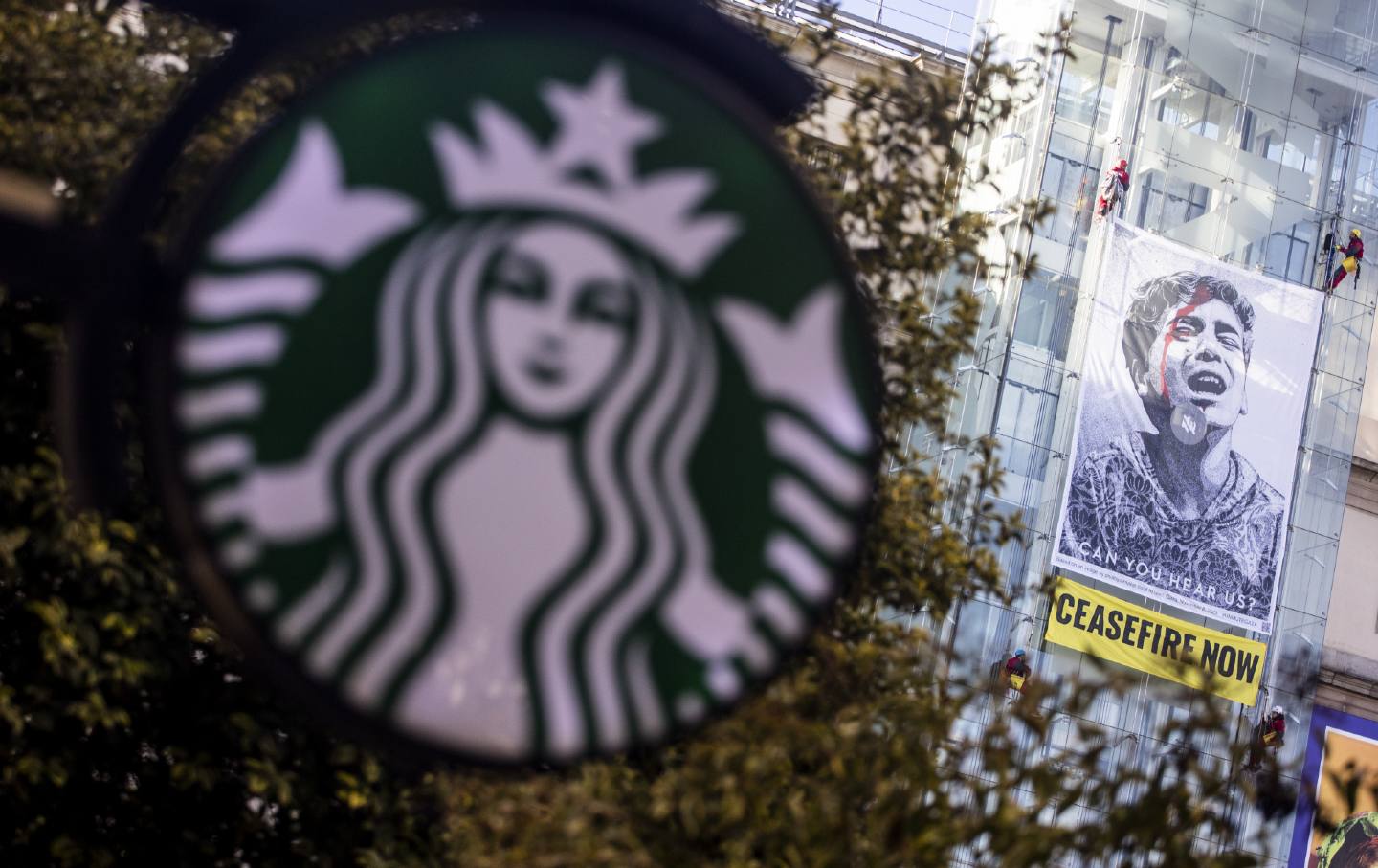
A Starbucks near the Reina Sofia Museum in Madrid, where Greenpeace activists hung pro-Palestinian banners on January 24.
(Bruno Thevenin / Anadolu via Getty Images)Three years of rank-and-file Starbucks worker organizing has produced a historic union breakthrough: a commitment by the implacably anti-union company to bargain a national contract for 10,000 workers and negotiate a process for additional workers to organize. Remarkably, though, this victory came about in part because of a serendipitous boost from the Palestine justice movement. It’s proof of the power—and indeed, necessity—of international working-class solidarity in taking on today’s leading fights against the giants of capitalism.
Starbucks workers dragged the concessions out of corporate executives through their tenacity and resilience. They beat back intense union-busting, won union representation elections at 392 stores in 43 states, and waged dozens of creative strikes, from single-store walkouts to national actions.
In late February—just days after announcing that workers at another 21 stores had petitioned for union elections—members of Workers United announced that the union had reached a “foundational framework” with the company on national contract bargaining and “a fair process for workers to organize.”
Starbucks executives agreed for the first time to a single national bargaining table for unionized baristas. The company also agreed to provide to the unionized workers the pay hikes and credit card tips it had given to workers at the non-unionized stores back in May 2022.
Negotiations also will commence over organizing rights at the company’s other US stores. Until now Starbucks has pursued a scorched-earth union-busting policy: firing workers, retaliating against others by changing schedules and other work rules, harassing and punishing pro-union baristas, and shutting down unionized stores. The National Labor Relations Board has charged the company with violating federal labor law in at least 120 separate instances. Moving forward, true organizing rights will be critical to building worker power, as the union footprint at Starbucks—impressive as those 392 victories may be—represents a mere 4 percent of the 9,645 US stores that company runs.
“We’re aware that this is only a first step—and so our feeling is one of jubilatory anticipation,” said Melissa Lee-Litowitz, a barista and Workers United organizer in Glenview, Ill.
To appreciate how workers got to this point, one must recognize the role of international solidarity. The mainstream and left press have almost entirely elided this aspect of the win. That is unfortunate, because there are important lessons for working-class internationalism embedded in the Starbucks organizing experience.
Last summer and fall, Starbucks workers were locked in a seemingly unending standoff with the company. Workers were petitioning for elections, but at a slower rate. The anti-union campaign was taking a toll, with firings and harassment of pro-union workers and with hundreds of unfair labor practice cases filed with the National Labor Relations Board or lingering in the courts.
On October 7, Hamas broke out of Gaza to attack nearby Israeli military posts and communities, killing 1,139 Israelis and foreign nationals, most of them civilians, and taking about 250 hostages back to Gaza. The Israeli military quickly launched a brutal counterassault on Gaza, which has already resulted in more than 30,000 deaths—most of them women and children. In the United States, Starbucks Workers United members joined the growing street protests calling for a cease-fire and an end to the Israeli occupation of Palestine. As the widespread Israeli air strikes on Gaza immediately after October 7 demonstrated that the military offensive was going far beyond self-defense or hostage-rescuing, union members spoke out publicly in support of Palestine. On October 10, the union’s account on X, formerly known as Twitter, posted a simple “Solidarity with Palestine” message. It quote-tweeted a picture of a Palestinian bulldozer knocking down part of the concrete-and-barbed-wire wall that Israel built to contain the 2.2 million residents of Gaza in an open-air prison.
The union deleted the message within an hour, but not before it sent Starbucks executives into a lather—and lured them into what became a political trap. The company issued a statement denouncing Workers United, falsely claiming that the union tweet showed “support for violence perpetrated by Hamas” and alleging that workers’ pro-Palestinian statements would harm the company’s bottom line. Starbucks denounced Hamas yet failed to call out the disproportionate Israeli violence, the Israeli targeting of civilians, or the ongoing occupation. The workers fired back with their own union statement, condemning the company “for shamefully using this devastating humanitarian crisis to make false statements against our union and to vilify us.” Then, in line with their ongoing scorched-earth strategy against the union, Starbucks sued Workers United for copyright infringement for using the company’s name in the union’s social media.
This newest arena of struggle between the Starbucks workers and bosses might have lingered on like the rest of the litigious war but for the simple fact that Starbucks is much more than a US company, and because social media today has instantaneous global reach. Starbucks has operations in 82 other countries around the globe. Its customers and investors—in particular in the Middle East and Asia, where sentiment is overwhelmingly pro-Palestinian—were not pleased that the company was providing cover for the Israeli state and its defenders in the US political establishment.
US brands across the board have taken a hit overseas as a result of the Israeli war on Gaza and the US government’s unswerving support for the Israeli brutalities. But Starbucks chose in response to the workers’ advocacy for Palestine to enter the geopolitical arena with vigorous declarations, making its overseas stores especially attractive targets for protests and boycotts. The foreign actions were amplified by boycott calls from social media activists in the US.
Popular
“swipe left below to view more authors”Swipe →Asian financial advisers recommended that investors dump their stocks in the company operating Starbucks franchises in Malaysia after they found “at least a 30 per cent fall in foot traffic, as a result of the ongoing boycott of Starbucks Coffee due to the Israel-Hamas conflict.”
In Oman, Jordan, Morocco, and other Arab countries, activists organized boycotts of Starbucks and other US brands. “Some campaigners have singled out Starbucks for suing its workers’ union over a post on the Israel-Hamas conflict,” Reuters reported.
In Turkey, where citizens organized sit-ins at Starbucks stores in solidarity with the Palestinians, the state-run railway system ordered its food and beverage contractor to remove Starbucks products from all dining cars. The state railway chairman pointed explicitly to the Starbucks Workers United struggle in announcing his decision. “Our [state railway] company does not have a contract with the coffee producer that has been accused of mistreating workers for criticizing Israel’s occupation and the suffering of our Palestinian brethren. We have officially instructed our contractor to provide passengers with alternative products instead of those from the mentioned coffee producer.”
On January 30, Starbucks CEO Laxman Narasimhan reported lower-than-expected earnings to investors and admitted that the pro-Palestinian boycotts and protests abroad had cut into the company’s profits, both domestically and overseas.
“We saw a negative impact to our business in the Middle East,” Narasimhan said. “Events in the Middle East also had an impact in the US, driven by misperceptions about our position.” That’s about as close as one will get to an admission that executives, by reacting with such hostility to a simple “Solidarity with Palestine” Workers United tweet, had made a costly political blunder, damaging company profits.
While Narasimhan was reporting to investors, he also was working damage control, directing Starbucks lawyers to settle the copyright infringement lawsuit and the union’s countersuit.
In a February 28 call announcing the “foundational framework” agreement to union members, Workers United leaders reported that the company had requested mediation talks to settle the lawsuits. It was out of these talks that the historic union organizing and bargaining breakthrough agreement was reached.
The international solidarity movement hasn’t yet stopped the Israeli carnage in Palestine, yet it can claim an important role in the breakthrough win for Starbucks workers. The global movement’s contribution, added on top of the workers’ persistent organizing and strike activity, helped force the “foundational framework” concession out of the global giant. It’s living proof of the power of international solidarity. The rank-and-file Starbucks workers who in October insisted on solidarity with Palestine may not have anticipated at the time how their stand would play out. Their advocacy for Palestine went against the advice that many labor organizers would have given: Stick to workplace issues. But in this case the Starbucks workers’ class instincts were spot-on. These grassroots, social-justice union sensibilities will be essential to carrying forward the next stage of the battle with Starbucks.
Hold the powerful to account by supporting The Nation
The chaos and cruelty of the Trump administration reaches new lows each week.
Trump’s catastrophic “Liberation Day” has wreaked havoc on the world economy and set up yet another constitutional crisis at home. Plainclothes officers continue to abduct university students off the streets. So-called “enemy aliens” are flown abroad to a mega prison against the orders of the courts. And Signalgate promises to be the first of many incompetence scandals that expose the brutal violence at the core of the American empire.
At a time when elite universities, powerful law firms, and influential media outlets are capitulating to Trump’s intimidation, The Nation is more determined than ever before to hold the powerful to account.
In just the last month, we’ve published reporting on how Trump outsources his mass deportation agenda to other countries, exposed the administration’s appeal to obscure laws to carry out its repressive agenda, and amplified the voices of brave student activists targeted by universities.
We also continue to tell the stories of those who fight back against Trump and Musk, whether on the streets in growing protest movements, in town halls across the country, or in critical state elections—like Wisconsin’s recent state Supreme Court race—that provide a model for resisting Trumpism and prove that Musk can’t buy our democracy.
This is the journalism that matters in 2025. But we can’t do this without you. As a reader-supported publication, we rely on the support of generous donors. Please, help make our essential independent journalism possible with a donation today.
In solidarity,
The Editors
The Nation

